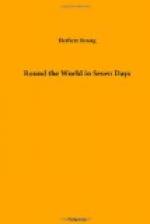“Thank goodness! Well, now, is there a smith in the village? You know what I mean: a blacksmith, a man who makes iron things?”
It was not a very clear definition, but the Hindu understood him.
“Yees, sahib,” he said; “smif that way.” He pointed to a hut at a little distance.
“That’s all right. Fetch the smith along, and I’ll get you to tell him what I want.”
“I know, sahib, I tell them. I do big trade in this place. They silly jossers, sahib; think you a djinn.”
“Well, put that right, and hurry up, will you?”
The Hindu salaamed and returned to the group of villagers. An excited colloquy ensued, the man pointing now to the Englishman, now to the aeroplane, and now to the dhow alongside the jetty. Presently the Hindu came back.
“Silly chaps say what for you come here, sahib. You know too much, they say.”
Smith guessed that they supposed his visit had something to do with the smuggling operations in which they were engaged. He explained quickly that he was merely an ordinary traveller, on his way to India in one of the new air carriages in which Englishmen were accustomed to make long journeys, and he promised to pay the smith well for any assistance he could give in repairing a slight injury which the carriage had suffered in a storm. The Hindu carried this message to the villagers, who were now increasing in number as they regained confidence, and after another discussion he returned, accompanied by a big man, the dirtiest in the crowd, the others following slowly.
He found it no easy matter, through his smiling but incompetent interpreter, to explain that he wanted the use of the smith’s appliances. To quicken their apprehension he produced a couple of half-crowns, pointing out that they were worth four rupees, and offered these as payment when the work was done. The Hindu recognized the King’s head on the coins, and eagerly assured the Baluchis that they were good English money; but the smith, true to the oriental habit of haggling, rejected them scornfully as insufficient, and was backed up by a chorus of indignant cries from the crowd.
Smith, impatient at the loss of time, and forgetting that any show of eagerness would merely encourage the natives to delay, was incautious enough to show them a half-sovereign. Though the Hindu appeared to do his best to persuade them that this was generous pay, they showed even greater contempt, and became more and more clamorous.
“Greedy chaps want more, sahib,” said the Hindu deprecatingly.
“Very well,” replied Smith, pocketing the coin. “We’ll do without them.”
He turned his back on them, and returned at a saunter to the aeroplane, the crowd, now swelled by the arrival of apparently all the inhabitants of the village, old and young, pressing on behind. It was evident that they had now lost their fear of the strange machine.
“How are you getting on, Roddy?” he asked. “These asses won’t take half-a-sovereign to lend a hand.”




